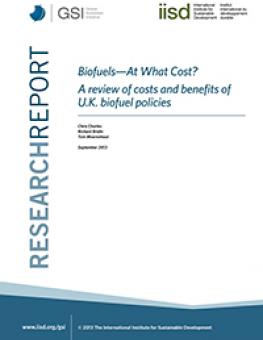
Biofuels - At What Cost? A review of costs and benefits of U.K. biofuel policies
This report evaluates some of the principal issues associated with the U.K.'s biofuel industry, including support policies, employment creation, emissions abatement, and the role of biofuels and other renewable technologies in meeting EU renewable energy targets.
It assesses the costs and benefits of the U.K.'s policies in meeting the objectives that EU member states have set out to achieve, including increased energy security, improvements in environmental performance and the generation of additional economic value. The report finds:
A number of policy recommendations are provided to promote the sustainability and effectiveness of U.K. biofuel policies.
- Support to the UK's biofuel industry in 2011 was estimated at £44-74 million for ethanol and £315-371 million for biodiesel.
- 2011 carbon abatement costs for UCO-based biodiesel were estimated at £154 per tonne of CO2 avoided. For ethanol, they were at £115 per tonne of CO2 avoided. Conventional biodiesel was responsible for net emission increases and no abatement cost was calculated.
- There is a wide range for the number of direct and indirect jobs created by the U.K. biofuels sector, estimated at between 1,356 and in 7,500 in 2011.
- Trade in biofuels and feedstock is significant, with significant volumes of corn for the production of bioethanol sourced from outside of the EU, principally from the United States. The main feedstock for biodiesel was overwhelmingly used cooking oil sourced from the U.K. and within Europe.
Participating experts
You might also be interested in
Policy Watch: UK's windfall tax shows why the drive to stop fossil fuel subsidies is still stuck in first gear
When the UK government announced a windfall tax on oil and gas companies to partly offset soaring household fuel bills in May, it sweetened the pill with a tax break on new oil and gas production.
UK must provide real climate leadership
While the UK talks tough, its agencies have continued to plough public funds into fossil fuels, writes Angela Picciariello.
Doubling Back and Doubling Down: G20 scorecard on fossil fuel funding
This study tracks, for the first time, each G20 country's progress on ending support for fossil fuels—ranking their transparency, commitments, and financial support to oil, gas, and coal.
It’s Official: The United Kingdom is to subsidize nuclear power, but at what cost?
A review of planned subsidies to the proposed Hinkley Point C nuclear power plant in the United Kingdom.